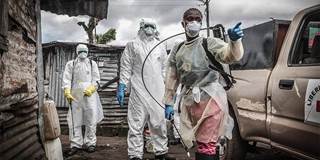The full scope of West Africa's recent Ebola epidemic – which caused three countries to grind to a halt, took thousands of lives, and shattered many more – remains unknown. But Sierra Leone is committed to getting the number of Ebola cases to zero, and doing what it takes to prevent a future outbreak.
FREETOWN, SIERRA LEONE – I was a young medical officer working at the Emergency Unit of the Ola During Children’s Hospital in Sierra Leone when I advised the mother of a child with severe malaria to tell a blatant lie. Her daughter Mariama needed a life-saving blood transfusion. But her mother had no money to pay for the screening tests and to compensate the blood donor. I had seen many children die while their parents frantically sought the necessary funds.

FREETOWN, SIERRA LEONE – I was a young medical officer working at the Emergency Unit of the Ola During Children’s Hospital in Sierra Leone when I advised the mother of a child with severe malaria to tell a blatant lie. Her daughter Mariama needed a life-saving blood transfusion. But her mother had no money to pay for the screening tests and to compensate the blood donor. I had seen many children die while their parents frantically sought the necessary funds.